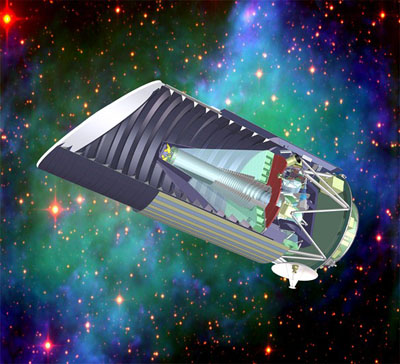Current Research

When launched, the Supernova Acceleration Probe (SNAP) will study the effects of dark energy by surveying distant type Ia supernovae and making detailed measurements of weak gravitational lensing.
With the new Large Hadron Collider (LHC) at CERN nearing full completion, experimentalists will soon be able to test certain elements of String Theory. While not definitive, these tests will cast some light upon the theory's parameters and may even provide clues into the identity of dark matter. Meanwhile, theorists continue to investigate the implications of String Theory for Big Bang cosmology, particularly the effects of strings on cosmic inflation.
As particle physicists eagerly await the results from the new LHC, observational cosmologists are busy developing astronomical experiments, such as the Supernova Acceleration Probe, to explore the fundamental questions posed by the existence of dark matter and dark energy.
Famous Observatories
 Down the Rabbit Hole: Telescopes
Down the Rabbit Hole: Telescopes
More to Explore: Unanswered Questions
So that's the end? We've covered everything there is to know about the Universe? Wrong! There's still a lot we don't know or can't explain about our Universe:
- Are there undiscovered laws of nature?
- Is there a Grand Unified Theory (GUT)?
- What is Dark Energy?
- What is Dark Matter?
- What happened before 10-44 seconds?
- Why are there so many different kinds of particles?
- Why did antimatter vanish?
And in the end, who knows, maybe you will be the one to solve the mysteries of the Universe!


